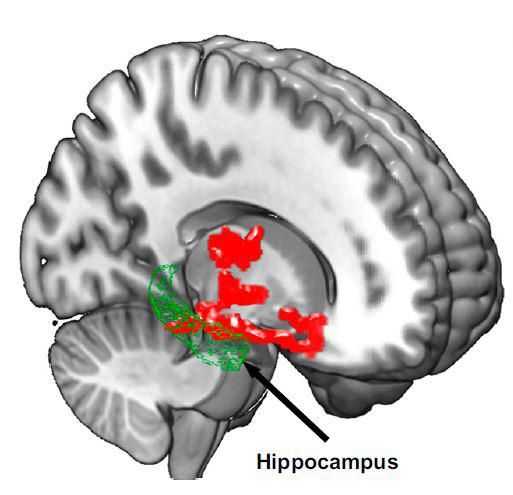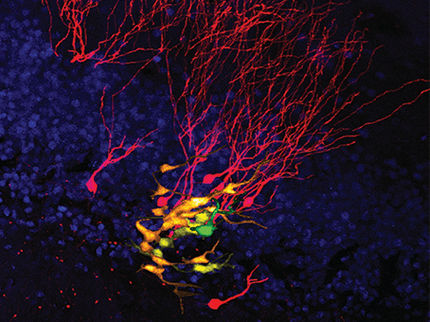Lack of sleep may be linked to risk factor for Alzheimer's disease
Losing just one night of sleep led to an immediate increase in beta-amyloid, a protein in the brain associated with Alzheimer's disease, according to a small, new study by researchers at the National Institutes of Health. In Alzheimer's disease, beta-amyloid proteins clump together to form amyloid plaques, a hallmark of the disease.

Brain imaging after one night of sleep deprivation revealed beta-amyloid accumulation in the hippocampus and thalamus, regions affected by Alzheimer's disease
Proceedings of the National Academy of Sciences
While acute sleep deprivation is known to elevate brain beta-amyloid levels in mice, less is known about the impact of sleep deprivation on beta-amyloid accumulation in the human brain. The study is among the first to demonstrate that sleep may play an important role in human beta-amyloid clearance.
"This research provides new insight about the potentially harmful effects of a lack of sleep on the brain and has implications for better characterizing the pathology of Alzheimer's disease," said George F. Koob, Ph.D., director of the National Institute on Alcohol Abuse and Alcoholism (NIAAA), part of the National Institutes of Health, which funded the study.
Beta-amyloid is a metabolic waste product present in the fluid between brain cells. In Alzheimer's disease, beta-amyloid clumps together to form amyloid plaques, negatively impacting communication between neurons.
To understand the possible link between beta-amyloid accumulation and sleep, the researchers used positron emission tomography (PET) to scan the brains of 20 healthy subjects, ranging in age from 22 to 72, after a night of rested sleep and after sleep deprivation (being awake for about 31 hours). They found beta-amyloid increases of about 5 percent after losing a night of sleep in brain regions including the thalamus and hippocampus, regions especially vulnerable to damage in the early stages of Alzheimer's disease.
In Alzheimer's disease, beta-amyloid is estimated to increase about 43 percent in affected individuals relative to healthy older adults. It is unknown whether the increase in beta-amyloid in the study participants would subside after a night of rest.
The researchers also found that study participants with larger increases in beta-amyloid reported worse mood after sleep deprivation.
"Even though our sample was small, this study demonstrated the negative effect of sleep deprivation on beta-amyloid burden in the human brain. Future studies are needed to assess the generalizability to a larger and more diverse population," said Dr. Shokri-Kojori.
It is also important to note that the link between sleep disorders and Alzheimer's risk is considered by many scientists to be "bidirectional," since elevated beta-amyloid may also lead to sleep disturbances.
Original publication
Ehsan Shokri-Kojori, Gene-Jack Wang, Corinde E. Wiers, Sukru B. Demiral, Min Guo, Sung Won Kim, Elsa Lindgren, Veronica Ramirez, Amna Zehra, Clara Freeman, Gregg Miller, Peter Manza, Tansha Srivastava, Susan De Santi, Dardo Tomasi, Helene Benveniste and Nora D. Volkow; "β-Amyloid accumulation in the human brain after one night of sleep deprivation"; PNAS; 2018
Original publication
Ehsan Shokri-Kojori, Gene-Jack Wang, Corinde E. Wiers, Sukru B. Demiral, Min Guo, Sung Won Kim, Elsa Lindgren, Veronica Ramirez, Amna Zehra, Clara Freeman, Gregg Miller, Peter Manza, Tansha Srivastava, Susan De Santi, Dardo Tomasi, Helene Benveniste and Nora D. Volkow; "β-Amyloid accumulation in the human brain after one night of sleep deprivation"; PNAS; 2018
Topics
Organizations
Other news from the department science
These products might interest you

Kjel- / Dist Line by Büchi
Kjel- and Dist Line - steam distillation and Kjeldahl applications
Maximum accuracy and performance for your steam distillation and Kjeldahl applications

AZURA Purifier + LH 2.1 by KNAUER
Preparative Liquid Chromatography - New platform for more throughput
Save time and improve reproducibility during purification

Get the analytics and lab tech industry in your inbox
By submitting this form you agree that LUMITOS AG will send you the newsletter(s) selected above by email. Your data will not be passed on to third parties. Your data will be stored and processed in accordance with our data protection regulations. LUMITOS may contact you by email for the purpose of advertising or market and opinion surveys. You can revoke your consent at any time without giving reasons to LUMITOS AG, Ernst-Augustin-Str. 2, 12489 Berlin, Germany or by e-mail at revoke@lumitos.com with effect for the future. In addition, each email contains a link to unsubscribe from the corresponding newsletter.
























































